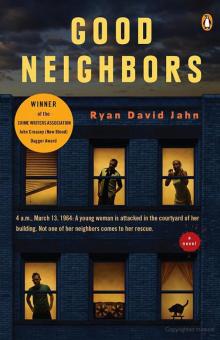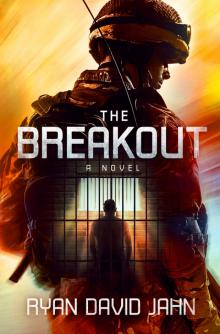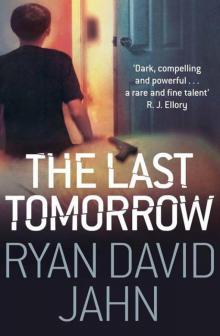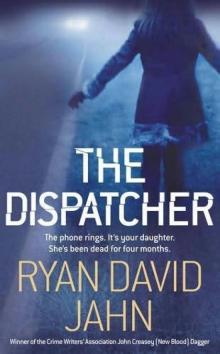- Home
- Ryan David Jahn
The Breakout Page 2
The Breakout Read online
Page 2
“Guess we’re done here,” Diego said.
The man nodded, lit another cigarette, held out his open pack.
Diego tongued his toothpick and said, “Quit last month.” He turned around, walked back to the feed shed, and glanced left at the ostriches sleeping behind a tall cedar fence. A breeze blew into his face, and their stink came with it. He stepped inside, made his way to the tunnel, and climbed down into darkness.
He trudged back toward Mexico, pushing the cart in front of him, that squeaky wheel whining at him the entire fucking time.
The man with the Nissan would drive the corpse into El Paso. He’d find a building where drug users were known to squat, or an alley where junkies were sometimes arrested, and dump the body there, making it look as though that was where Layla had overdosed.
The dead body might lie there for two or three days before the smell got bad enough for someone to realize something was wrong. Junkies weren’t the most observant of people, and regular folk tended to avoid places where junkies hung out. Once the corpse was found, police would arrive, see she’d given herself a shot of bad medicine, and the case would be closed before it was opened. Accidental death due to overdose. End of story.
Diego climbed out of the tunnel Mexico-side and pushed Jesus back into place. Walked out of the church, down the steps, and across the gravel driveway to his truck. Slid in behind the wheel, started the engine, and shoved the transmission into gear.
He drove away from there and almost immediately forgot about Layla.
But he’d soon get a hard reminder.
2
James Murphy was arrested on a Wednesday.
He was sitting behind the wheel of a rented Ford Taurus, key in the ignition and engine running, but only so he could keep the air conditioner on. The car faced south, sun shining in through the passenger window as midday gave way to evening. A park lay to his right, a well-kept hundred acres of grass, playground equipment, walking paths, and benches shaded by the dense leaves of summer trees. But none of that was of interest to him. Nor were the shadows stretching long in his direction and growing longer as the sun made its descent.
He was watching an estate several hundred yards to the south, watching cars enter and leave. He’d crossed the border into Juarez around nine o’clock Monday night, but spent no time there. Instead, he drove straight through, heading west to La Paz, the place his sister had been living before her dead body turned up in El Paso.
It was a thirty-minute drive from Juarez.
You passed through empty desert along a two-lane strip of faded asphalt. Wild shrubs and cacti dotted the landscape on either side of you. Headlight beams splashed across roadkill, guts spilled out like tangled rope. Aside from the road you were traveling on, you saw no signs of human life. Almost half an hour passed before La Paz came into view in the distance, flickering dim in the night. Five minutes after that you turned right onto Avenida Hidalgo, and as soon as you did, you were in La Paz, a nondescript Mexican town of interest only because it was home to the man you blamed for your sister’s death.
He’d checked into Hotel Amigo, where he was now staying, and after taking a shower and changing clothes, walked across the street to Los Parados, a local dive bar he’d seen while parking. It was dark inside, only neon beer signs and a lamp above the scuffed pool table illuminating the place. About two dozen people inside, either sitting at small round tables or the bar; a couple drunk men throwing darts against the far wall. He sat on a duct-taped stool at the counter and poured a few beers down his throat, staring at nothing and thinking about his sister. He wondered if she’d ever come in here, wondered if she ever sat where he was sitting.
A prostitute, perhaps forty, approached him. She said he was handsome and asked if he had a room across the street. He told he wasn’t interested. She pretended to be offended, hoping he’d buy her an apology drink, but when he didn’t, she moved on to the next guy. After an hour he went back to his room and lay down, hoping to get some sleep, but ended up staring at the ceiling, listening to Mexican television until sunlight broke through the window.
Since then, he’d spent at least twenty cumulative hours parked here, watching, but hadn’t seen Alejandro Rocha. Others had come and gone, but Rocha remained unseen, hidden behind the walls of a house larger than the apartment complex James had lived in before joining the Marines, all twenty-five units, the house itself hidden behind a sturdy stucco wall and wrought-iron gate, set at the back of a long cobblestone drive bifurcated by a fountain, a small nude boy pissing into a cast stone bowl.
He looked through his dirty, wiper-streaked windshield, watching as cars and trucks entered or left the estate, looked through binoculars to see the faces of the people in those vehicles, hoping each time the face he saw belonged to the motherfucker he wanted to kill. But each time he saw someone else, someone he didn’t recognize. He’d been hoping to find some sort of pattern in Alejandro Rocha’s behavior, but he hadn’t seen Rocha at all.
He glanced now to his passenger seat and the jug of water sitting there. He picked it up and took a drink. He thought about the M40A3 sniper rifle wrapped in a blanket under his hotel room bed.
Once he knew more about Rocha’s behavioral patterns, he’d bring it out, set up a good distance from the man’s estate, anywhere from five to eight hundred yards, kill the son of a bitch, and be gone before anyone even knew what had happened. Before the mist of blood hanging in the air had even settled to the ground.
He’d imagined squeezing his trigger dozens of times since he learned of his sister’s death, since her body had been discovered next to a dumpster in El Paso by two boys taking a shortcut to school. He imagined the view through his scope, imagined squeezing his trigger and feeling the rifle kick against the crook of his shoulder. The head snapping back. The skull opening, exploding outward, ejecting a messy triangle of brains, blood, and bone shards.
Two blue-and-white police cruisers turned left off the cross street to the south and rolled toward him, their light bars flashing. The lead car rumbled past, swinging left to block him in from behind, while the other car pulled up to his front bumper and stopped only after it made contact with the Ford Taurus.
James keyed off the engine and put his hands on the steering wheel, in plain sight, hoping to keep everything cool.
A uniformed police officer stepped from each vehicle. They wore navy pants and light blue shirts with navy pocket flaps and shoulder straps. Their badges caught the fading sunlight as they walked toward him, right hands resting on their duty weapons. One was tall and thin and clean shaven, the other short and heavyset with facial hair trimmed into a Van Dyke.
“Good afternoon, sir,” said Van Dyke in English, squinting down at him.
“Something the matter?”
“There any reason you’ve been parked here for the last several hours?”
“It is a park.”
“It’s suspicious is what it is.”
“In what way?”
“Why are you parked here, sir?”
“No good reason.”
“You were parked here yesterday as well.”
“Did someone complain?”
“This is a good neighborhood, the wealthiest citizens of La Paz live near here, and strange cars make them nervous. We’ve received several phone calls.”
“I haven’t done anything illegal.”
“Nobody accused you of illegal activity, sir. Why would you mention it?”
“You’re the police.”
“We’ll need to see your driver’s license.”
James unfolded his leather wallet, slipped his license from its sleeve, and held it out pinched between his index and middle fingers. Van Dyke yanked it away, held it about a foot in front of his face, and squinted at it.
“Austin, Texas.”
“Yes, sir.” He’d been living in El Paso for the last month, since he’d returned from Afghanistan, but his license still listed the address at which he’d lived before joining the Ma
rines six years earlier.
“What brings you to Mexico?”
“Had a little time off from work, thought I’d check it out.”
“What sort of work do you do?”
“Marine Corps sergeant.”
“Stationed at Fort Bliss?”
“For the time being. Got back from Afghanistan last month.”
“Fort Bliss is an Army base.”
“Marine Corps detachment.”
Van Dyke handed James back his license. “Step out of your vehicle, sir.”
“I’m not sure that’s necessary.”
“We’re gonna search your car.”
“No, you’re not.”
Van Dyke thumbed the strap off his holster. “I wasn’t asking permission, Mr. Murphy. Step out of your vehicle.”
“No. Last time I checked it wasn’t illegal to sit in a parked car. You’ve got no probable cause to search my vehicle.”
Van Dyke drew his duty weapon, aimed it at James. “Step out of the vehicle now, and keep your hands visible. My reason for searching your car is that I choose to. You’re not in the United States and you’d be smart to remember that.”
James hesitated a moment before he pushed open the door and stepped out onto the street, hands raised to his shoulders. Van Dyke turned him around, kicked his feet apart, and frisked him, finding nothing.
“Stay here,” he said to James. To the other cop he said, “Buscar el coche.”
James sat on the hood of the car and waited for the harassment to be finished.
The thin cop searched the interior, coming up eventually with several computer printouts of articles about Alejandro Rocha, but nothing more. He pulled the key from the ignition, walked around to the trunk, opened it, and searched inside.
“Qué chingados,” he said, holding up two bricks of what looked like cocaine.
James stood up and said, “Now, wait a minute. Those aren’t mine.” But even before the words left his mouth, he knew there was no point in speaking them. The cocaine had been planted and the only people who might’ve done it were the cops about to arrest him.
“We’re taking you in,” Van Dyke said, his duty weapon raised. “Turn around and put your hands on the hood of the car.”
“I’m not sure I’m gonna do that,” James said.
“You will unless you want to get shot. Turn around.”
“We all know those drugs were planted.”
Van Dyke swung his weapon toward James’s left temple.
James reached up and grabbed the wrist, pulled the gun out of Van Dyke’s hand, and turned it around on him. He did this on instinct, without thinking of the consequences, and as soon as it was done he regretted it. It put him in a situation even worse than his last one. He was sure his license plate had been punched into the system. If he killed these men, La Paz Police Department would trace the rental car back to Hertz, which would trace it to him, and he’d end up going down for murder instead of drugs. Not exactly an improvement.
Now he needed to figure out how to extract himself from this situation.
“Why don’t I just get in my car and drive away?”
The thin cop stepped around the trunk with his own weapon raised. In poor English, he said, “Drop … or I … shoot you.”
“Your hand is shaking,” James said. “You’ll miss. Why don’t you drop your weapon and let me leave?”
“No,” the thin cop said. “Do as I say … or die.”
Either James overtook these men, which might lead to one or both of them getting killed, or he let himself be arrested—those were his choices—and though part of him leaned toward overtaking them, consequences be damned, he knew he needed to think about his reason for being in Mexico. He was here for Alejandro Rocha, the man responsible for his sister’s death, and he didn’t intend to leave until the man had paid for it.
“Okay,” he said. He leaned down and set the gun on the asphalt.
As soon as he did, Van Dyke kicked him in the face, bloodying his nose. “That’s for pointing my own gun at me, pendejo.”
James had to resist the urge to fight back, and instead let Van Dyke grab his right wrist, twist his arm behind his back, and slam him down onto the car hood. His cheek lay against the hot metal. Sweat dripped from his nose. Van Dyke slapped a handcuff around his right wrist, pulled his left arm behind his back, and cuffed that one too. He pulled James up, walked him to the police cruiser parked behind the Ford Taurus, yanked open the rear door, and shoved James into the backseat. He slammed the door shut.
* * *
Van Dyke drove him to La Paz police station, which was located in an all-purpose municipal building, a sign on the beige-painted stucco façade reading MUNICIPIO DE LA PAZ, and on each glass door a vinyl sign identified the organization behind it, including, on the third door from the left, POLICIA. The building sat at the end of Calle Tortuga on the west end of town, several dust-covered police cars parked along the shoulder of the road leading up to the building. There was an empty space right out front. Van Dyke pulled the cruiser into it. He killed the engine, pushed out into the bright, hot day, stood a moment under a Mexican sun that had melted a hole in the blue firmament, and pulled open the back door. He grabbed James by the shirt collar and yanked him from the cruiser. Pushed him toward the police station, up the steps, and through the glass door. The door sighed shut behind them.
Tepid air blew from several vents, making the station almost comfortable.
The desk sergeant glanced up at them with low-lidded eyes, stared a moment, and looked back down to the manual typewriter in front of him, tapping out his words slowly and with great force to ensure each whack marked all three carbon copies. Yellow, pink, blue.
Van Dyke led him past the desk sergeant and a squad room littered with cheap fiberboard desks—and a few disheveled cops—to a room containing only a metal table and two foldout chairs. He shoved James into the room and yanked the door shut.
A moment later it locked with the solid metal clack of a dead bolt.
* * *
Almost an hour later, a man of about fifty, with a thick comb of a mustache that covered his upper lip and deep crow’s feet around the eyes, walked into the room. He wore a brown suit. His black hair was greased back except for a strand that hung loose over his right eyebrow, curling back up on itself like a fishhook. He nodded at James and without a word unhooked the cuff from his left wrist. He sat him down in one of the foldout chairs and clasped the loose cuff around a thick steel staple welded to the edge of the table. Sat down across from James, pulled out a pack of cigarettes, and stuck one between his lips. Lit it with a scratched Zippo, took a deep drag, exhaled through his nostrils. He held the cigarette pinched between index finger and thumb. Used his teeth to peel a flake of dry skin from his bottom lip and spat it to the floor.
“I’m Detective Ernesto Huerta and I have many questions for you, James Murphy.”
“I don’t have any answers. The cops planted that cocaine in my trunk.”
Detective Huerta waved away the statement with a lazy sweep of his left hand, as if shooing away a fly. “My questions don’t concern the cocaine in your trunk.”
“What do they concern?”
“Your interest in Alejandro Rocha—and the rifle my men found in room two thirteen.”
“You searched my hotel room?”
“We’ve been aware of you since your arrival, Mr. Murphy. La Paz isn’t a town people regularly visit. What’s your interest in Rocha?”
“Who?”
“Don’t pretend you know not whom I speak of.”
“I’m not pretending.”
“You had twenty-seven news articles about him in your car.”
“I might have heard of him.”
“So what’s your interest?”
“I don’t see how that’s any business of yours.”
“It is if it’s related to the rifle.”
“I’m licensed to carry that gun.”
“Not in Mexico. Drug
and weapons charges are very serious business. Especially with the amount of cocaine found in your trunk.”
“I told you already, those drugs were planted.”
“That argument will not go very far with a judge.”
“How’s it going with you?”
“What’s your interest in Alejandro Rocha?”
James only stared. Said nothing.
“This will go better if you cooperate.”
“I’m not interested in cooperation. Not with the bought-and-paid-for cops of La Paz Police Department.”
“Trust me, Mr. Murphy, you do want to cooperate. You want to do this the easy way.”
“You don’t have a clue what I want,” James said. “If cooperating with you is the easy way, I’ll go the hard way.”
Detective Huerta shrugged. “So be it. I’ll take you to La Paz City Jail where you’ll be held until your trial’s finished, at which point you’ll either be moved to one of the long-term blocks at the jail or transferred to Cereso state prison in Juarez. Your conviction, however, is not in question.”
“When can I expect the arraignment?”
“It could be ninety days; it could be six months. There’s no hurry to get this done. But it doesn’t matter. As soon as you’re there, prison will be your home until you die. You fucked with the wrong individual.”
“I didn’t fuck with anybody.” But James now regretted allowing himself to be arrested. Rocha must have seen James—or been told about him—and sent the police out to bring him in. A man watching his estate was a man worth taking an interest in, and cops were good at getting information out of people. They’d already learned more than he wanted them to know, and they’d surely pass along what they’d learned to Rocha.
“You said you wanted the hard way,” Detective Huerta said. “You’ll get it.”
* * *
Detective Ernesto Huerta shoved James into the back of a black sedan, slammed shut the door, and got into the driver’s seat. Started the car and slid it into gear. The fan belt squealed. He looked in the rearview mirror at James and James looked back. Detective Huerta slipped a cigarette between his lips and set the end on fire. Cracked his dust-covered window and blew smoke out the side of his mouth.

 Good Neighbors
Good Neighbors The Breakout
The Breakout The Last Tomorrow
The Last Tomorrow The Dispatcher
The Dispatcher